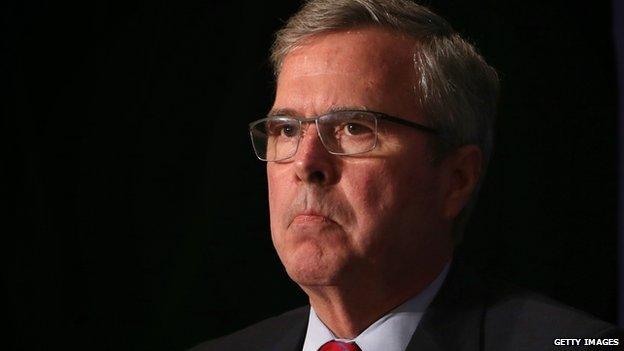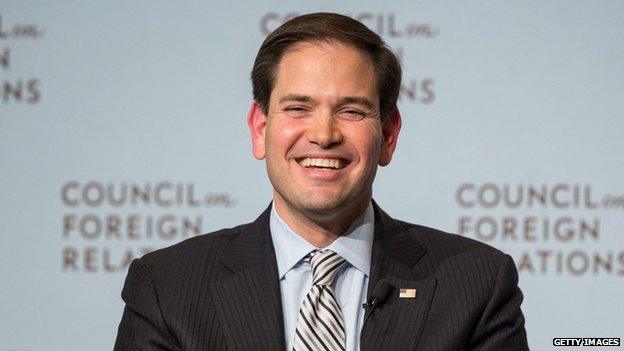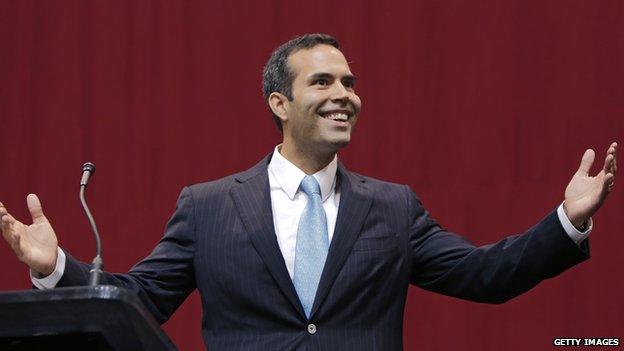What happens to Jeb Bush's 'independent' campaign war chest if he loses?
- Published

It may not seem possible, but the almighty dollar could be about to exert even more influence on US politics - and former Florida Governor Jeb Bush is blazing the trail.
What's more, Mr Bush could be creating the equivalent of a campaign finance battleship that lasts beyond this particular election - or uses its prodigious weapons in support of another candidate, if Mr Bush were to get knocked out of the race early.
According to multiple, external press reports, external, the former Florida governor will fund the bulk of his campaign infrastructure - television advertising buys, opposition research, voter outreach, position papers - through Right to Rise, the political action committee that will exist independent of his formal campaign apparatus.
The reason for this is that "official" campaigns are limited in the amount of money they can raise. So-called "super Pacs", on the other hand, can amass unlimited amounts from corporations, unions and individual donors with the deepest of pockets.*
There's a drawback to all of this, of course. Technically, super Pacs like Right to Rise must operate independently of presidential candidates. Any co-ordination between the campaign and a Pac is illegal.

Defining co-ordination, however, can be tricky. If Candidate X's team announces publicly that it'd really like to have television advertising in New Hampshire, South Carolina and Nevada, and X's super Pac starts running spots the following day … well, that's all just a legally permissible coincidence, right?
Another convenient loophole is that, until candidates officially announce, they can work with whatever super Pac they want.
Mr Bush is far from alone, external in setting up these Pacs. Virtually every major candidate, and even most minor ones, have established something similar - with varying levels of funding success. Mr Bush is, however, leading the Pac pack, with an estimated $100m in the bank. And it's Mr Bush and his supporters who are currently pushing the envelope in exactly how much of its campaign operations can be handled externally.
Overlooked in all of this talk of a Bush juggernaut, however, is the possibility that Mr Bush's prodigious independent political treasury could outlive his candidacy.
Last week was rough on the nascent Bush campaign, with the candidate repeatedly stumbling on questions of whether the Iraq War was a mistake. Mr Bush, at best, appeared a bit rusty on the stump. Others argue that his ties to George W Bush, his presidential sibling, will create an open wound on his candidacy.

Senator Marco Rubio might make an attractive Plan B for Jeb Bush's millions
Mr Bush continues to show weakness in his poll standings, as well. He trails or is effectively tied in many early voting states like Iowa, external and New Hampshire, external and is among a handful of candidates jostling for top tier status, external in national polls.
There's the not insignificant possibility, then, that Mr Bush's candidacy could falter. As the old sales parable goes, external, no matter how you package it, sometimes the dogs just don't like the dog food. Republican voters might never warm to the Florida governor, no matter how much he spends.
If that's the case, Mr Bush could get knocked out of the race but still have tens of millions of dollars (or more!) in his Pac. And the thing about an "independent" Pac is, if Mr Bush is done, that money could go just about anywhere, says Larry Noble, senior counsel for the Campaign Legal Center, a public interest watchdog group.
"He could pretty much do anything he wants with it," says Noble, whose group has filed a federal complaint over the legality of Mr Bush's co-ordination with his super-Pac during his "non-candidacy" period. "He could turn it into a non-profit or keep it going as a super-Pac to keep his name in play."
About the only thing Mr Bush couldn't do, Moble says, is give the money directly to a political campaign. But Right to Rise could certainly partake in the same sort of "uncoordinated" support for someone else as it had been designed to provide for candidate Bush.
What if, for instance, fellow Floridian Marco Rubio were the fortunate beneficiary? He was, after all, Mr Bush's supposed protege in the Florida legislature, a man he helped support as speaker of the state House of Representatives. Sealing the Republican nomination for Mr Rubio might not be a bad Plan B for ex-candidate Bush.
Mr Bush could, in effect, become a Republican kingmaker surpassing even billionaires like the Koch brothers and Las Vegas casino magnate Sheldon Adelson, who are already being relentlessly courted by presidential suitors.
Once upon a time, in the not-too-distant political past, the endorsement of a defeated candidate was largely symbolic. Even when, say, John Edwards backed 2008 Democratic winner Barack Obama over Hillary Clinton early in the primary season, there were no guarantees his voters would follow his lead. And any delegates a candidate accrued through primary victories were usually released to vote their conscience.

Right to Rise could someday provide a boost to Jeb Bush's son, George
An endorsement did bring the possibility of campaign infrastructure - strategists and grass-roots organisers - going to the receiving candidate, which could prove handy down the road. But if anything, ex-candidates were a fund-raising drag, as they often would condition their support future on assistance in retiring their campaign debt.
Now, however, an endorsement could come with a financial windfall, making it all the more valuable. Want a choice appointment in a Scott Walker administration? Mr Bush may have millions of reasons why he'd make a good pick.
Then again, says Noble, Mr Bush could decide to sit on most of the money, saving it for another day and another campaign. The former governor is only 62 years old. There might be another play for the presidency or some other political office in the cards.
"For the most part, these people are very reluctant to give up control over their money that could be used to help them," Noble says. "Because it really could be a formidable war chest in the future."
And then there's Mr Bush's son, George P Bush, who was just elected as Texas land commissioner and is considered a rising star in the state's Republican circles. He's even helped fundraise, external for his father's super Pac. Someday, a well-heeled Right to Rise committee could be used to "independently" advance his career - a political trust fund, as it were.
That's all part of the brave new world of 2016 campaign finance. The race is becoming as much a contest of committees as it is a battle between actual flesh and blood candidates. And no matter which individual politician ends up winning or losing, the committees likely will keep chugging along - an enduring legacy to a candidate, or even a candidate's heirs.
There are only winners where big money is concerned.
